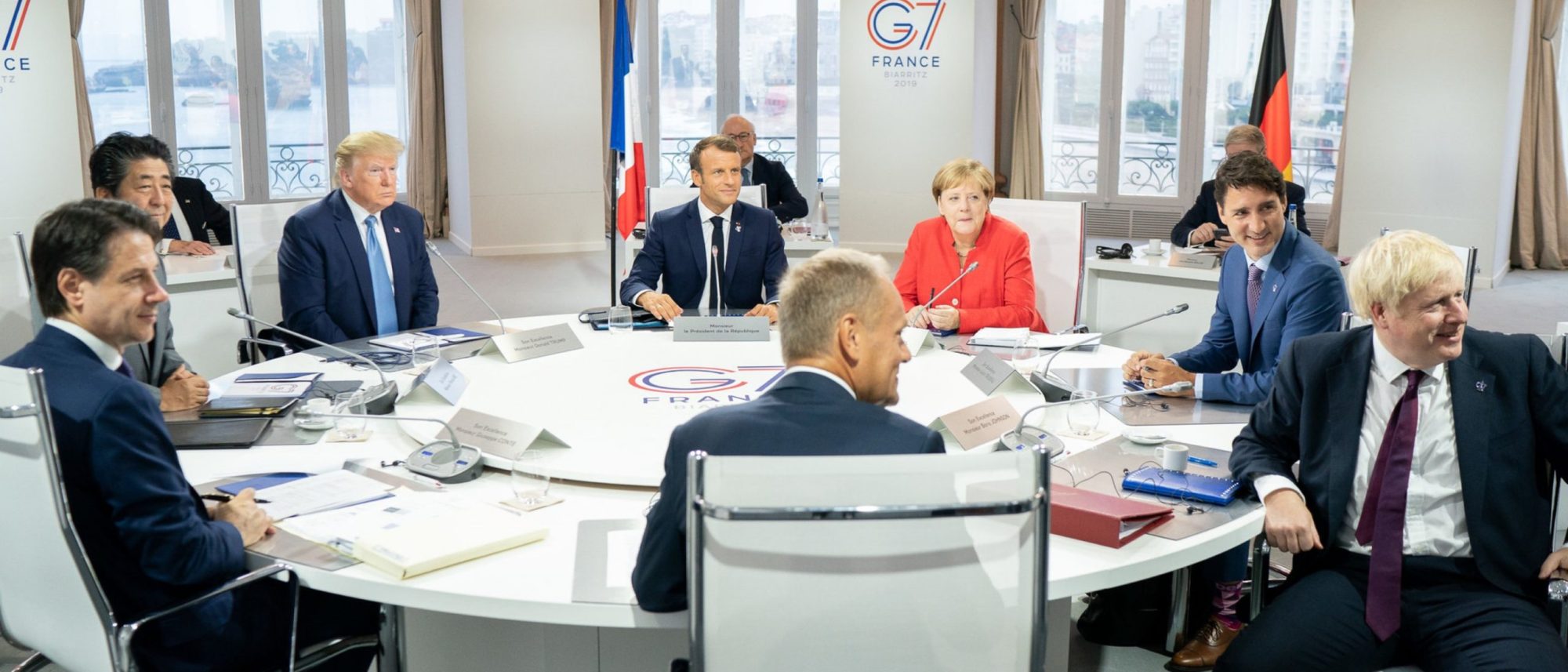How is the G7 doing? The summit’s commitments in times of pandemic
The many skeptics of the annual G7 summit of major market democracies have long doubted that the promises its leaders make together from their sunny summit peak are actually kept when they return to the dark valleys of domestic politics back home. Such skepticism has spiked as US president Donald Trump prepares to host the 2020 G7 summit, amid a still deadly COVID-19 pandemic and massive economic pain. Yet the latest evidence shows that in the lead-up to US-hosted summit this year, G7 members’ compliance has soared to a new high of 83%. John Kirton and Meagan Byrd explore why.
Rising compliance since 1975
From 1975 to 2018, G7 compliance with all 570 priority and routine commitments assessed by the G7 Research Group averaged 75%. In the crisis-ridden period between 1975 and 1981, compliance averaged only 67%. During the new Cold War from 1982 to 1988, it was 66%. But after the Cold War victory, from 1989 to 1995, compliance rose to 69%. Then, as globalization acquired full force, compliance rose to 73% from 1996 to 2002, to 77% from 2003 to 2010 and to 80% from 2011 to 2018. Since 2017, when Donald Trump first arrived, G7 compliance has been above the historic average, reaching 79% with Taormina’s commitments in 2017 and 76% with Charlevoix’s commitments in 2018.
By subject, above-average compliance since 1975 has come on macroeconomic policy and digitalization at 86%; arms control, regional security and energy at 82%; the environment (excluding climate change) at 80%; terrorism and food-agriculture at 78%; democracy at 77%; and health at 76%. By member, compliance was led by the European Union at 85%, the United Kingdom at 84% Canada at 83%, the United States at 80%, Germany at 79% and France at 75%. Japan at 73% and Italy at 63% had below-average compliance. US compliance rose from only 58% after President Trump’s first summit at Taormina in 2017 to 73% after his second summit in neighbouring Canada in 2018.
High compliance from Biarritz in 2019
Since the 2019 Biarritz Summit, compliance has surged to a new high. Compliance with its 21 priority commitments, during the period from 28 August 2019 to 13 April 2020, was 83%. This score matches the 83% final compliance with the 2018 Charlevoix priority commitments and is higher than the 80% final compliance with 2017 Taormina’s priority commitments.
G7 members’ compliance with their Biarritz priority commitments by April 13, 2020 has risen sharply from the 62% recorded in the G7 Research Group’s interim report covering implementation up to December 2019. Compliance has thus risen by an unprecedented 21% since President Trump became the G7’s chair on January 1 this year.
Compliance up to 13 April, 2020, as the original 10–12 June date for the 2020 summit approached, was led by the European Union at 95%. It was closely followed by the United Kingdom, which will host the G7 next year, at 93%, Canada at 90%, and France as Biarritz’s host at 83%. Then came Japan at 76%, Germany at 75%, and the United States at 74%. Italy had only 55%.
Three of Biarritz’s priority commitments had 100% compliance: one each on digital democracy, universal health coverage and artificial intelligence. Two others had 94%: one on the Sustainable Development Goals and one on gender equality. The commitment on environment, focused on biodiversity, had 81%. The lowest compliance came on primary health care at 31%.
Policy recommendations
To enhance their credibility, legitimacy and effectiveness, G7 leaders at their 2020 US summit should use two proven, low-cost accountability measures under their direct control. They should agree to hold G7 meetings of the ministers responsible for their key priority subjects and make more commitments on those subjects and also overall.
Their commitments should focus on those subjects that produced high compliance from Biarritz and before, that support President Trump’s initial priorities of economic growth, deregulation, trade and energy security, and that reinforce the health and economic focus of the 27 commitments G7 leaders made at their emergency videoconference summit on 16 March 2020 to respond to the COVID-19 crisis.
Thus at their 2020 summit, G7 leaders, inspired and supported by the work of the Think 7 engagement group, should agree to:
- Ensure equitable access to COVID-19 vaccines, therapeutics and diagnostics; expand universal health coverage; promote digital health; and work to keep their promise to end HIV/AIDS by 2030.
- Reduce the gender inequality caused by COVID-19, support the many women in the healthcare workforce, and counter gender-based violence at home and on the job.
- Make their economies more resilient, jobs rich and pandemic proof, in part by giving all of their own and others’ citizens affordable access to universal health coverage.
- Forge agreement on digital governance and data flows, e-commerce and e-service provision in ways that protect users’ information.
- Do their fair share to meet the global goal of planting 1 trillion trees by 2030, using locally appropriate trees that provide medicines, health and biodiversity, nurturing their growth, preventing deforestation, creating many new jobs for this purpose, and promoting Indigenous peoples, as the Italian-hosted 2009 G7 summit pioneered.
In all cases these actions will reinforce and produce a fast start to realize the priorities set by the bigger, broader G20 summits, to be hosted by Saudi Arabia in November 2020 and by Italy in 2021 and thus help build a safe, sustainable, shared world.
This article was originally published by ISPI. For more content on the G7 and COVID-19, visit the ISPI website.












